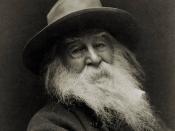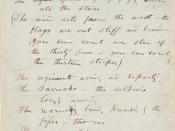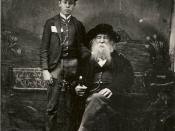Walt Whitman and Emily Dickinson have often been contrasted in literary criticism. Both poets are credited with an expansive body of work that is both ambitious and provocative. Dickinson has been characterized as the aristocracy to Whitman's democracy, the seclusion to his crowd, her doubt opposite his certainty. (Sherman3) Dickinson may be more complicated and aware of the deception of many hopes. She discovers many planes between self and nature. She pushed to a greater distance than Whitman does into the subjective sphere of self-doubt and of chaos. (Keller8) She wrote her poetry for herself rather than others. Whitman tended to write as a representative of all the American people. Dickinson wished to reserve her poetry to herself, as she did not want her works to be judged by others. (Gall4) "Whitman sees the poetic act as a means of reconciling the solitary self with the world while Dickinson views consciousness as always at war with a recalcitrant, ultimately alien and unknowable universe."(Library
Journal 82) While they vary in numerous ways, Whitman and Dickinson endure as this nation's most prominent contributors to American poetry and are our greatest understanding of the distinctively American Essence. (Godey12)
The issue for Dickinson is not our collective humanity, or the democratic equality of individuals. The issue for her is a spiritual problem stated in familiar terms. Dickinson begins from an assertion of innate doubt, and then, through the course of writing the poem, tediously originates a truth about her own self. (San2) Growing up she rebuffed the opinion that the world was evil, and she would not suppose that there was a greater heaven beyond earth. She refused to proclaim herself a sinner and such a refusal demanded an astounding degree of innovation and audacity. Her writing suggests that all through her life she...


